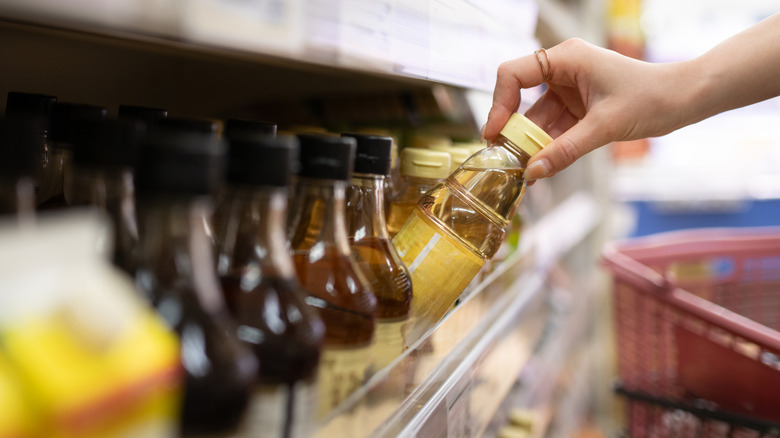Why You Might Want To Start Refrigerating Your Vinegar
Vinegar has long held its place as the indestructible pantry workhorse: A no-fuss, shelf-stable staple with a near-eternal lifespan. But even the most low-maintenance ingredient deserves a little fridge time, at least according to Ina Garten. The celebrity chef and cookbook author behind Barefoot Contessa, Ina Garten stores her good-quality vinegar in the refrigerator. Why? To help preserve its nuanced flavors.
Sure, vinegar's high acidity makes it naturally resistant to bacteria, which is why it lasts so long unrefrigerated. But flavor is another story. Like olive oil, vinegar — especially varietals like sherry, balsamic, and unpasteurized wine vinegars — can lose complexity when exposed to heat and light. Cold storage helps slow that flavor deterioration. That doesn't mean you need to keep a jug of distilled white vinegar next to your oat milk, but if you shelled out for a fancy bottle of Champagne vinegar, imported balsamic, Andrew Zimmern's favorite fruity calamansi, or sherry vinegar, tucking it into the fridge can help it stay bright and balanced longer. It's the same logic that applies to storing your soy sauce in the fridge or keeping shelf-stable miso in a cool spot: It's technically fine at room temp, but higher-quality ingredients deserve a little chill.
Vinegar can degrade, especially if it's unpasteurized
Pasteurized vinegars have been heat-treated to kill off any live bacteria or yeast, which helps preserve them longer at room temperature. But that same process also dulls some of the more delicate flavors. Unpasteurized vinegars, like raw apple cider vinegar with the "mother", still contain active cultures, making them a popular pick for home cooks chasing funk and fermentation. The downside? Those flavors break down more quickly when left in a hot cabinet, especially after opening.
Cold storage won't stop that aging process entirely, but it can help delay it. Much like storing parmesan cheese in the fridge instead of on the counter, the goal isn't food safety, it's preservation of flavor. You're not going to get sick from room-temp red wine vinegar, but it might taste noticeably flatter after a few months of summer heat. If you're using vinegar as a finishing ingredient — drizzled over a crunchy chopped salad or whisked into an olive oil dressing — it's worth preserving that punch. So the next time you open a nice bottle of vinegar, consider giving it the same treatment you'd give wine: cork it, chill it, and savor it while it's fresh.

